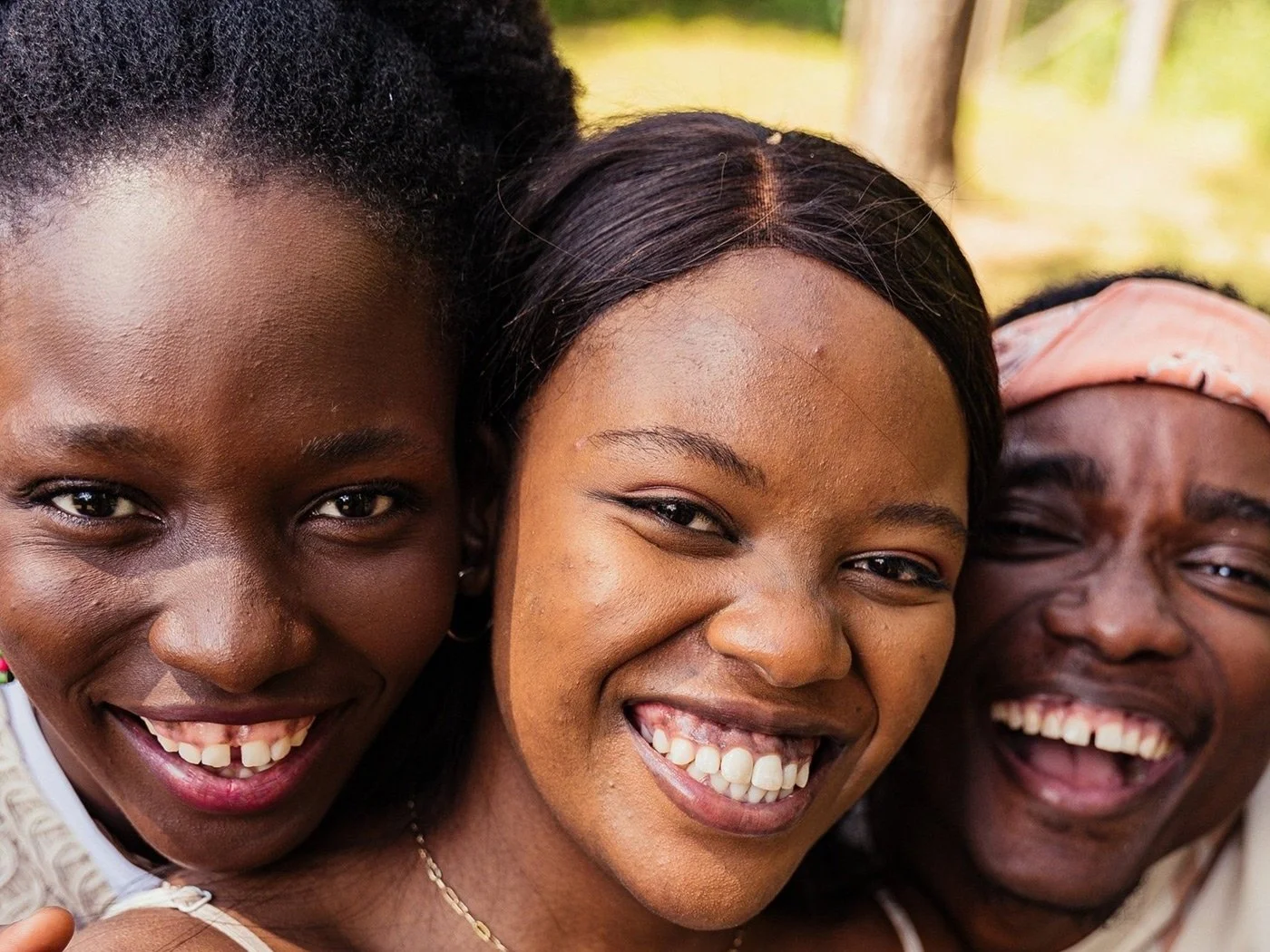Communities of color face unique challenges and systemic barriers that affect our overall sense of calm and wellness. Witnessing countless examples of racism and violence against people of color with an unclear path on the best way to advocate for equality and justice for all can be exhausting. These feelings of constant frustration disrupts our nervous system and can lead to anxiety. Yet, the first month of the year gives us an opportunity to reset our minds, bodies, and spirits.
Humor Doesn't Heal, But Sometimes Joy Can Help
Laughter is a way to express pleasure or display our sense of humor. We laugh when things are funny, we laugh when we're experiencing joy, and we laugh when we see our experiences reflected back in a new way. Laughter can help us release tension in a moment of anger or lift us out of the sinking feeling of sadness.
If You’ll Be Grieving This Season, Traditions Can Trigger Sadness
Reminders Every Strong Black Woman Needs
Pride Month is not only a time for rainbows but for checking in on our community
Pride Month is not only a time for rainbows but for checking in on our community
By: Yolande Clark-Jackson
June is the time for celebrating summer, Juneteenth, Men’s Health, and Pride Month. Facebook is using the rainbow background for profile pictures and for posts. Human rights organizations are hosting virtual dance parties, and people in cars across the country will wave their rainbow flags. LGBTQIA+ members, activists, and allies will march and celebrate in solidarity to boldly show pride in the face of those who insist there should be shame.
Pride month commemorates The Stonewall Uprising that happened in New York City on June 28,1969. Marsh P. Johnson and Slyvia Riveria were two transgender activists who pushed back agaisnt being treated as criminals for living outside the expectations of their gender designation.
We believe the freedom to decide who we are and who we choose to love is a human right. Unfortunately, there are others who do not agree. As a result, members of the LGBTQIA+ communities have suffered abuse from those who are committed to enforcing hetersexual standards and binary thinking. And, those living outside the binary structure have been made to feel ashamed or broken. LGBTQIA+ adults and teens have suffered ostracization from not only society, but also their families and communities. For this reason, It is often hard for members in this community to show their pride every day of the year. When feeling rejected and persecuted, it is challenging to maintain mental, emotional and relational health, especially when you don’t feel safe.
According to a USA Today article, over the first half of this year, 13 transgender men and women were killed, and those murdered were either Black, Latinx, or Asian. Knowing these statistics, it makes sense why those in LGBTQIA+ community suffer from anxiety and depression.
Anxiety and Depression
According to the National Alliance on Mental Illness, “LGB adults are more than twice as likely as heterosexual adults to experience a mental health condition. Transgender individuals are nearly four times as likely as cisgender individuals (people whose gender identity corresponds with their birth sex) individuals to experience a mental health condition.”
With these statistics, it’s no surprise that many gender-nonconforming and LGBTQIA+ adults and teens also suffer from depression.
Last year statistics from the Trevor project, a LGBTQ suicide prevention organization for youth showed the 40% of LGBTQ youth suffered depression and contemplated suicide.
It is for this reason, that Pride Month is not only a time to celebrate the gains that have been made through activism, but to also acknowledge the work that still needs to be done and support those who need it.
Support for the LGBTQIA+ Community
As a community of support, pride month is a good time to reflect and remember that some things go beyond black or white, or gay or straight. It is a good time to check in to see how well we can accept the spectrum of experiences that exist in our communities. In this month of June, we can check in to see how we can do better, and support should not begin or end in June.
We want to celebrate the lives of Black, Brown and Indigenous LGBTQIA+ and support their mental, emotional and relational wellness all year long.
We want them to know that seeking out professional health for mental, emotional and relational well-being is always important. Particularly, it is essential to find a culturally affirming therapist to discuss and process feelings of stress, anxiety, and depression. And, we want their families to know that their mental health is key in becoming the best advocate for those they love.
At Ibisanmi Relational Health we provide a healing space for all members of the LGBTQIA+ community and their families to talk and share their experiences. We are here to listen and support you. You can book your 15-minute consultation here.
And, be sure to follow us on IG at @ibisanmi.relational for mental health check ins and inspirational posts.
A Year Later: COVID-19 and What You Still Need
By Christiana Ibilola Awosan, PhD., LMFT
It has been a year since the whole world faced COVID-19, the virus that led to frenzy, quarantines, questions, and confusion. By now, many of us either know someone who has either gotten sick from the virus or died from it. The pandemic continues to affect all of our lives in various ways, and some more than others. After a year and more than 500,000 lives lost, many are still getting infected and dying. And, we are all trying to deal with the aftermath beyond the heartache of losing loved ones. The ripple effects of the pandemic have led to financial insecurities and loss of physical connections with our communities. We are grieving multiple losses.
According to the APA “We [as a nation] are facing a national mental health crisis that could yield serious health and social consequences for years to come.”Sadly, “years to come'' is right now for many of us, and we need to address it. We have all felt and continue to feel the mental, emotional, and relational turmoil caused by this pandemic. We are all struggling to cope or live with this new reality of COVID-19. The grief of countless losses caused by the virus weighs on our mental, emotional, and relational well-being which has sparked depression, anxiety, isolation, and great fear surrounding the uncertainty of the future.
What the Pandemic Has Cost Us:
The pandemic has cost many of us sleep and peace of mind. You may be experiencing irregular eating patterns, feeling more tired or restless, and unable to focus or concentrate. You may also be experiencing loneliness and feeling increasingly impatient with yourself, loved ones or coworkers. All of these symptoms are signs of grief that you need to address to maintain not only your physical health, but also your mental, emotional, and relational well being.
Being aware of your mental, emotional, and relational needs will allow you to identify the types of support you need during these difficult times.
Mental needs:
Time and space to process your thoughts
Acknowledgement of the losses you have experienced and are currently experiencing
Patience with yourself and others
A list of your hopes for the future
Emotional needs:
Validation of your fears, anxieties, and hopes
Time and space for your emotions to flow
A channel for your emotions: speaking, writing, drawing, walking, dancing, cooking, exercising
Relational needs:
Support from the people and communities who see and love you
Support from the people and communities who see and love you
Connection with your families and friends
Humility and vulnerability to ask for what you need from your significant relationships
For all of these needs, seeking out professional help for your mental, emotional and relational well-being is important. You don’t need to do this on your own. At Ibisanmi Relational Health, we’re available to help you through your journey. We can help you work through the pain and the grief during these difficult times. Book your 15-minute consultation here.
And be sure to follow us on IG at @ibisanmi.relational for mental health check ins and inspiration.












When we prioritize our mental health, we can enjoy a clearer mind, a better sense of self, improved productivity and an increased capacity to manage unexpected change. The best part: Making adjustments to your daily life doesn't have to be difficult. Mental health experts weigh in to share practical ways to make your mental health your priority…